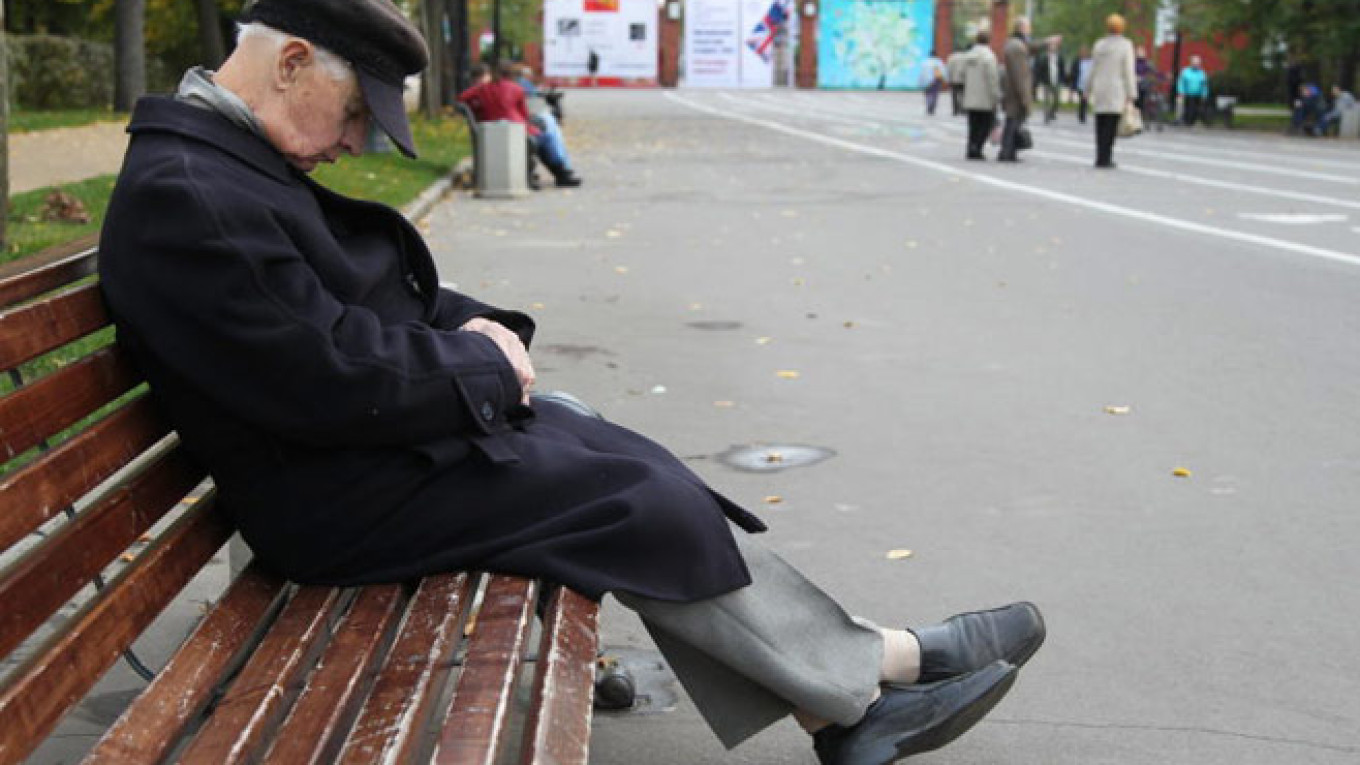Russia's economic crisis is forcing the government to consider sweeping savings on pension payouts, a move that could go down badly with a core part of President Vladimir Putin's electorate.
The Finance Ministry this week floated a proposal to save more than 2.5 trillion rubles ($46 billion) over three years by raising pensions at less than the rate of inflation.
The measure comes as the ministry struggles to slash spending amid an economic recession that is eroding budget revenues.
A steep devaluation of the ruble has meant that prices have grown much faster over the past year than salaries, and since payroll taxes are the main source of income for the pension system, the Finance Ministry has said continuation of inflation-linked pensions could threaten the country's state-run pension fund.
In May, average nominal incomes were 7.3 percent higher than in May 2014, while prices were on average 15.8 percent higher, according to the Rosstat state statistics service.
"If the income of the fund continues to grow slower than its payouts, it could break the entire pension system," the Vedomosti newspaper quoted Deputy Finance Minister Maxim Oreshkin as saying last month.
The government is already subsidizing a 3.3 trillion ruble ($60 billion) hole in the pension fund, said Pavel Kudyukin, an associate professor at Moscow's Higher School of Economics.
"This is no longer affordable for the state," he said.
Pre-Crisis Thinking
According to documents for a government meeting on Monday obtained by news agency RBC this week, the Finance Ministry has drawn up plans to curb planned pensions increases from 7 percent to 5.5 percent in 2016; from 6.3 percent to 4.5 percent in 2017 and from 5.1 percent to 4 percent in 2018.
That means that payments will be increased not in the line with the actual inflation, which is expected to fall back into single digits early next year, but according to inflation forecasts made in early 2014, before Western sanctions over the Ukraine crisis and a sharp decline in global oil prices pushed Russia's economy into recession. Russian GDP is expected to shrink by around 3 percent this year.
These changes, together with cuts to some other undisclosed social spending items, would save around 2.5 trillion rubles over 2016-18, RBC reported, citing the Finance Ministry documents.
The government has said no decision has yet been taken.
The changes may require changes to legislation, which requires that Russian pensions are indexed twice a year in line with inflation.
Political Consequences?
Spending on pensions has risen rapidly in recent years as President Putin has sought to use booming oil revenues to raise living standards of pensioners and low-paid state employees.
Pensions were raised even in 2009, during Russia's last economic crisis, Kudyukin said.
Russia's roughly 40 million pensioners receive on average 12,900 rubles ($240) in state pension payouts, according to the data from Russia's pension fund. ?
The Finance Ministry's proposal to abandon the link between pensions and inflation aroused sharp criticism from other ministries.
Maxim Topilin, the labor minister, demanded that money be found for the indexation of pensions for next year and the following years and for an analysis of the effectiveness of spending, news agency RIA Novosti reported Tuesday.
Analysts polled by the Moscow Times doubted that the measure would be implemented, as pensioners provide a bedrock of support for President Putin ahead of planned elections in 2018.
"Pensioners are the current government's main electoral support,"said Pavel Salin, head of the political science center at the Financial University. "The authorities will not reduce pension payments on the eve of the election period."
Unwillingness to alienate voters is why another Finance Ministry proposal, to cut government expenses by increasing the retirement age of civil servants from 60 to 65 years, has little chance of approval, analysts said.
Hiking the retirement age has been on the agenda for several years — the idea has been repeatedly promoted by former Finance Minister Alexei Kudrin — but has never gained traction.
But even if the Finance Ministry succeeds in making savings on pensions, any discontent would not lead to dramatic political consequences, experts said.
The move could cost Putin a few percentage points off his rating, but not dozens, Salin said.
Putin could afford that — the president's approval rating is at a record high of 89 percent, according to a poll by the Levada Center released Wednesday.
Given the political apathy of Russians and a surge in patriotic feeling that followed Moscow's annexation of Crimea from last year, people will bear less generous pensions, Kudyukin said.
"The question is, for how long will they bear them?" he added.
Contact the author at [email protected]
A Message from The Moscow Times:
Dear readers,
We are facing unprecedented challenges. Russia's Prosecutor General's Office has designated The Moscow Times as an "undesirable" organization, criminalizing our work and putting our staff at risk of prosecution. This follows our earlier unjust labeling as a "foreign agent."
These actions are direct attempts to silence independent journalism in Russia. The authorities claim our work "discredits the decisions of the Russian leadership." We see things differently: we strive to provide accurate, unbiased reporting on Russia.
We, the journalists of The Moscow Times, refuse to be silenced. But to continue our work, we need your help.
Your support, no matter how small, makes a world of difference. If you can, please support us monthly starting from just $2. It's quick to set up, and every contribution makes a significant impact.
By supporting The Moscow Times, you're defending open, independent journalism in the face of repression. Thank you for standing with us.
Remind me later.


